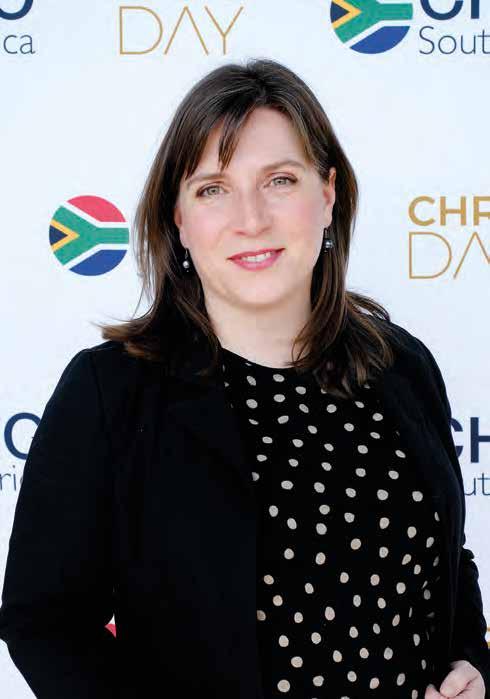
6 minute read
Deep relationships into the future
Cape Town’s finance professionals gathered at the 180Lounger for a Summit, overlooking the beautiful skyline of the Mother City, to share ways in which they can enable their finance teams and ready them for the future. By Caylynne Fourie and Ronda Naidu
After taking in the marvellous views of Table Mountain, the Atlantic Ocean and the towering buildings of Cape Town’s bustling city centre, attendees gathered together for the start of the CFO Cape Town Summit on 22 June. The prevailing view throughout the evening, from the speakers and attendees, was that deep relationships with the business and its stakeholders were the key to becoming future-fit. Coronation Fund Managers CFO Mary-Anne Musekiwa said, “If things change like they did when the
Advertisement

Covid-19 pandemic broke out, or during the multiple uncertain events we’ve faced since, the strength of our relationships are part of what’s going to get us through.” “When you are in a crisis, suppliers are able to give dispensations because of the strong relationships they have with you as a client, and if you have a strong relationship with your board, they will trust you to weather the storm,” she added.
Woolworths South Africa CFO Justin Crowhurst agreed, saying that finance professionals can’t know everything, so they have to rely on strategic partnerships to help move them to be more agile and innovate. For FNB South Africa CFO Markos Davias, his relationship with his chief risk officer is the most important one. “Finance and risk data are both assets to any organisation, but they don't always talk to each other and often go in opposite directions. We then have to do endless reconciliations to align the data with our strategy. However, when you are aligned with your CRO, you can converge these data sets.”
Enabling growth
Mary-Anne revealed that fostering and investing in these relationships is what makes you a good leader. When some of her team members expressed interest in learning how to code, she had to invest in their growth, even if it had nothing to do with finance. “They then brought AI and bots into our finance division, and took away most of the mundane tasks we used to do.”
She explained that: “The delivery will take care of itself if you take care of the people who deliver.” Webber Wentzel CFO Aneshree Naidoo said that growth was an essential part to moving into the future. “If we’re not creating the space for others to grow and move forward, we won’t either. You have to truly understand your team’s passions and how it can play into the group’s strategy.” Harmony Gold FD Boipelo Lekubo and Santam CFO Hennie Nel both agreed that enabling an environment in which people can flourish is important, and that finance leaders need to allow their people to arrive and be seen for who they are.
“As leaders, we assume people should listen to what we say and we don’t take the time to listen to them,” Hennie explained. “I started intentionally creating opportunities to engage, not just around the processes and numbers, but around how they saw the business. I listened to their opinions and built their confidence to contribute to the future of the organisation.” Echoing this, Justin said that finance leaders have to build on their own empathy skills, as they might not come naturally. “We have to make sure we have time to actively listen to and engage with that presenting voice so we can create an enabling environment where they have the confidence to raise that voice.”
The finance function of the future
Markos explained that, if finance wants to become a business partner of the future, CFOs have to let their teams become solutionists. “A while ago, we threw a chemical engineer in our finance team, and during one of our reporting periods they noticed a problem with the numbers. The finance team knew how to solve the problem by just dragging the number from one place to the next, but the chemical engineer was interested in where the problem came from and why.” He explained that through this interaction, his team learned how to analyse problems “scientifically” and to solve it in a way that it would never occur again. They’ve since applied the same thinking to other problems in the organisation. Similarly, Justin believes that finance teams need to have entrepreneurial mindsets. “As a finance team, we have to be more customer-focused – it’s what entrepreneurs do well. They build long-term relationships and emotional connections with their customers, know what their needs are and how to fill it. If you don’t apply the same mindset, your organisation won’t remain relevant and it won’t succeed.”
Agreeing that a mindset shift needs to happen within organisations, Boipelo believes that finance should be innovative. “We deal more and more with uncertainty and complexity, but you have to have the ability to be agile and adapt, to innovate and move forward.” In the same vein, Aneshree noted that people and technology are not mutually exclusive. “We can’t go digital without thinking about people. Technology can be an enabler, creating capacity and space for people to get closer to the business. And if you deploy the right people, the benefits of your technology transformation will be fast and furious.”
During a presentation, SAP industry head of financial services Darrel Orsmond referenced a recent interview with Standard Bank CFO Arno Daehnke in which he explained that finance is past the stage of measuring income statements. “CFOs have become the de facto measuring point for value and are being held accountable to have an opinion on divisions that reach far beyond the numbers of the organisation.”
Knowing what you don’t know
Darrel said that finance leaders now need to bring together data that has to do with productivity, and marry sales data to marketing data to determine actual returns. “The finance function is being looked at to forecast and predict what the consequences of foolhardiness and wisdom might be to the organisation.” However, he explained that various blindspots have emerged in this process, because they are not directly correlated to the income statement and financials.
These blind spots include: • True buying behaviour and motivation; • The real costs of doing business; • Lost opportunities; • Segment migration drivers; • Substitute and replacement drivers; • Future earnings risks and potential; • True segment behaviour drivers; and • Workforce motivation.
“These things matter more than ever. Because the people who don’t have those blind spots are getting all the business,” Darrel said, encouraging the attendees to find their blind spots and to use technology to make the unknown known.l
This event was made possible by principal partner SAP, executive partner Workday, and associate partners ACCA, Coupa, Kyriba, Solugrowth and The Strategist.













